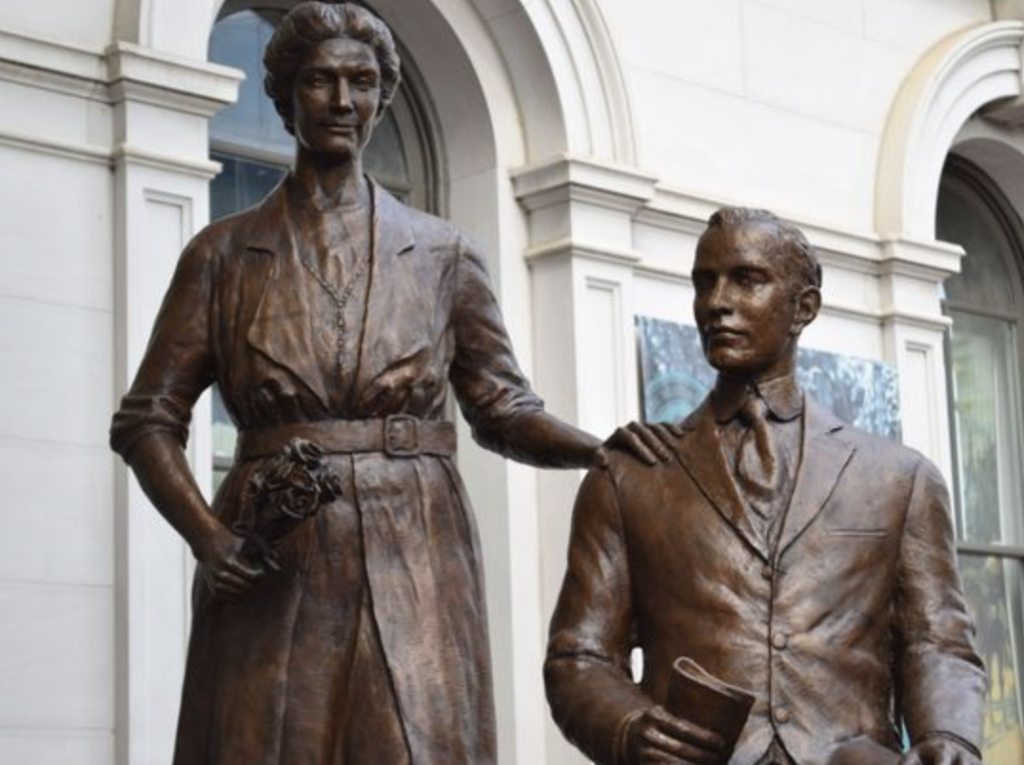Biographical Overview
Phoebe Ensminger Burn was born in the quiet community of Mount Verd, Tennessee on November 23, 1873, and was more often well-known by her nickname of “Febb.” She was married at age 22 to James Lafayette Burn but was widowed in 1916 when James passed. In 1895, she gave birth to Harry Thomas Burn, who would eventually go on to serve on the Tennesse General Assembly where both he and his mother made history in the ratification of the 19th amendment in August of 1920.
Febb was an educated woman who graduated from, what is currently, Tennessee Wesleyan University in 1894. It was not commonplace for women to attend and graduate higher education, especially in southern states like Tennessee. She even went on to hold a career as a teacher in Niota, Tennessee. She owned a farm, along with her husband, and worked alongside many men who did not have the same education as Febb, but could vote in political elections. Harry T. Burn even noted this disparity and how it affected his vote in favor of the ratification of the 19th amendment.

Harry T. Burn received a letter from Febb which ultimately changed the fate of the ratification of the 19th amendment. Together, they both made history and Febb has been eternalized as a influential mother who ended up changing the history of the United States.
The Ratification of the 19th Amendment
The 1920s was a decade where advocates for women’s rights made tremendous strides in the United States government. For years before the ratification of the 19th amendment, women all over the United States had rallied and protested for equality and the right to vote; prominent women like Carrie Chapman Catt, Elizabeth Cady Stanton, and Susan B. Anthony all helped to push women towards a more equal country. It took decades for their efforts to reach federal hands, and even then, their fate was not yet guaranteed. In the state of Tennessee, the assembly was one of the remaining states to hold a meeting to vote on the 19th amendment; at this point in time thirty-eight states had already voted on ratifying the amendment while eight had voted against it. For the ratification to be legitimized, one more state needed to vote in favor of it.
Initially, Burn entered the meeting with a significant amount of pressure on him to vote against the ratification; he was up for re-election and needed votes, especially because the majority of the citizens staunchly opposed the ratification. If he had voted in agreement to ratify the 19th amendment, there was the possibility that he would lose the support of the members of his state so he donned a red rose on his lapel to symbolize his anti-suffrage position. Febb, his mother, knew the pain of the neglect of women’s rights and wanted to urge her son to vote for women’s suffrage and penned a heartfelt letter expressing how she felt.
Dear Son:
Hurrah and vote suffrage!…Don’t forget to be a good boy and help Mrs. Catt put the “rat” in ratification. Your Mother.
Excerpt from Febb’s letter to Harry T. Burn
That day, not only did Burn don a red rose on his lapel, he also entered the meeting with his mother’s note in his coat pocket; a physical reminder of the importance of passing the ratification of the 19th amendment. The council was tied 48:48 and Burn was the last to make the final decision; he was faced with standing for what he believed in or appealing to voters. Ultimately, he voted in favor of the ratification of the 19th amendment, abiding by his mother’s advice. Not only did his vote change the outcome of Tennesse, but it was his vote that pushed the ratification throughout the entire country, as now enough states had voted in favor of it. Without Febb’s words weighing on him throughout the meeting, there is the very real chance that Burn could have succumbed to the political pressure and voted against the bill.
Significance
One of the main events that identify the 1920s as the memorable decade it was is the fact that women gained the right to vote, which carried a huge weight along with it. It was a breakthrough for women all across the United States; they were viewed as politically active citizens, their voice mattered now! It sparked a huge movement of freedom throughout the decade; women wore shorter skirts, dated, went out to parties, and many other things that were once taboo for them. What would the 1920s have been like if women did not gain this monumental advancement? Arguably the most defining feature of the 1920s is the stark contrast in the way women viewed themselves in society; they could go out and enjoy a night just like their male counterparts, they could dress in the clothes they felt most comfortable in, and they were no longer bound to be silent in elections.
This article chooses to focus specifically on Febb as her actions directly impacted the ratification of the 19th amendment; a mother felt so strongly about women’s suffrage that she wrote her son on the morning of the council meeting in a passionate attempt to sway his vote. There is no way Febb could have known the severity of her actions; for her son to be the tie-breaking vote seems to be almost destined, in a way. However, she must have known the importance for Tennessee to vote in favor of ratification as the United States government needed one more state to be able to put the bill in motion. If Tennessee had rejected the ratification, it would have delayed the process and put the stakes even higher for the fate of women’s rights. Febb was educated and held a career as a teacher in Tennessee; she was smart and knew how important it was for women to win this fight. She knew of the pressure her son might have been facing and saw his hesitation and reluctance, so she decided to write to him that the efforts of the suffragettes should not go unheard and to vote in favor of the movement. Though it was behind the scenes, Febb Ensminger Burn made history that day.
Citations
1930 US Federal Census, Febb E. Burn
Cohen, Jennie. “The Mother Who Saved Suffrage: Passing the 19th Amendment.” History. August 16, 2010. https://www.history.com/news/the-mother-who-saved-suffrage-passing-the-19th-amendment
Find a Grave, Febb Esminger Burn
“Harry T. Burn.” National Park Service. https://www.nps.gov/people/harry-t-burn.htm
Nunley, Esther. “Desk of Febb Ensminger Burn Donated to Museum.” Daily Post Athenian. July 21, 2017. https://www.dailypostathenian.com/community/article_217c0300-6e1c-11e7-8086-10604b9f0f42.html
The Nineteeth Amendment and After, Wm. L Marbury, Virginia Law Review, Oct., 1920, https://www.jstor.org/stable/1064407

Sarah Grider is a student of the 2021 Spring Discovering Digital History class at the Ramapo College of New Jersey. She is currently studying History and Museum & Exhibition Studies. She is an editorial assistant for the Jane Addams Papers Project.
